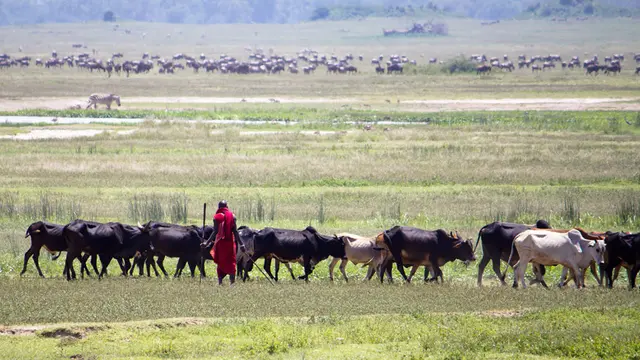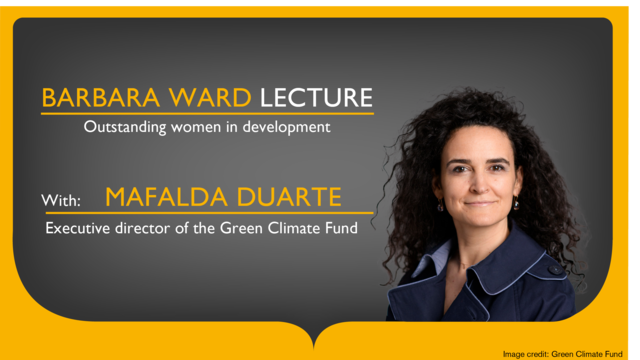Supporting the LDCs on climate change adaptation
As climate negotiators meet in Bonn, Batu Uprety says the mandate of the Least Developed Countries Expert Group must be renewed at COP21 to continue to support the LDCs on climate change adaptation.


Tea pickers in Kenya's Mount Kenya region; smallholder folders in Least Developed Countries would be adversely affected by climate change (Photo: Neil Palmer/CIAT, CC BY-SA 2.0)
Over the last 14 years, the Least Developed Countries Expert Group (LEG) has provided support, capacity building and advice on climate change adaptation (CCA) to the Least Developed Countries (LDCs).
As it comes to the final year of its mandate, it is timely to look back at how the group has worked in advancing support to the LDCs, identifying areas for additional support, strengthening the LEG and renewing its mandate during COP21.
The LDC category was established by the UN in recognition of the unique structural handicap to development in our countries – they are low income, have high economic vulnerability and weak human and institutional capacities. LDCs also lack capacity in interpreting scientific and technical data and information, and they lack the technologies needed to address the ongoing and emerging threats of climate change.
Despite being the least responsible for causing this global problem, the impact of climate change is already being felt in our countries – from droughts to floods, extreme weather events and climate-induced disasters. The very survival of our countries and future generations are at stake.
The mandate
Established by the United Nations Framework Convention on Climate Change (UNFCCC) COP7 negotiations in 2001, the 13-member LEG is mandated to provide the LDCs with technical support and advice on preparing and implementing their national adaptation programmes of action (NAPAs) and implementing the LDC work programme.
In 2011, LEG was given an additional mandate to provide technical guidance and support for LDCs to the process to formulate and implement National Adaptation Plans (NAPs). The LEG meets twice a year and reports to the Subsidiary Body for Implementation (SBI) – one of the permanent bodies established under the UNFCCC.
LEG activities
The LEG was set up as part of a package to support the LDCs through the LDC work programme in order to effectively implement Article 4.9 of the UNFCCC, which states that 'the parties shall take full account of the specific needs and special situations of the least developed countries (LDCs) in their actions with regard to funding and transfer of technology'.
The COP7 also established the Least Developed Countries Fund (LDCF), and agreed on the guidelines for the preparation of NAPAs.
All LDCs have now prepared NAPAs taking a 'learning by doing approach' to address the most urgent and immediate adaptation needs. The LDCs have generated evidence-based knowledge and experience on climate change adaptation and on how people and ecosystems can adapt to and build resilience against the impacts of climate change in highland, dryland and island ecosystems.
They have been able to share learning on prioritisation and the effectiveness of adaptation actions to address climate change impacts, improve livelihoods and promote economic diversification. This knowledge and experience is an 'asset' which LDCs will make good use of in the NAP formulation process.
As per the COP mandate, LEG provides support to the LDCs by preparing guidelines, technical papers, and other outreach materials, as well as building and enhancing capacity through regional training workshops and events. The LEG regularly organises side events about its activities during SBI sessions, sharing experience of adaptation planning and of local activities to meet the urgent needs of climate vulnerable communities and ecosystems.
The LEG identifies the needs of the LDCs through regular surveys and contact with the relevant representatives. We have convened NAP Expo annually since 2013 as a broad platform for sharing innovations, practice, learning and evidence-based knowledge to catalyse action and support for the NAP process. We have also created NAP Central as a repository for sharing adaptation knowledge to encourage countries to share their information through the country portal.
Through its regional training and workshops, LEG has ensured there are officials in each LDC who have the core knowledge to work on the NAP process. The LEG is also producing resource materials on strengthening gender considerations in adaptation planning and monitoring and evaluation process to further support LDCs on their adaptation 'marathon'.
The LEG engages and collaborates with a range of organisations such as UN organisations and specialised agencies, the Green Climate Fund, the Global Environmental Facility and its agencies, research and academic organisations, NGOs, development partners, and other bodies. It also assists LDCs on ways to access funding for adaptation.
Adaptation financing
Adaptation actions are currently funded from the pledge-based LDCF and Special Climate Change Fund, the Adaptation Fund, and from bilateral and multilateral assistance. The LDCF has provided funding for the most urgent and immediate adaptation needs as prioritised in NAPAs. It is also mandated to support the NAP process in LDCs.
This fund is now 'empty' and technically approved projects have not been funded. The LDCs are struggling to secure funding to implement NAPAs and start the NAP process.
Future adaptation funding will most likely be supported from the GCF as 50 per cent of its funding is allocated to adaptation actions. Of this, only half is guaranteed to be allocated to the LDCs, Small Island Developing States (SIDS) and African countries – the 98 most climate vulnerable countries.
Support needs
The LDCs are facing a perennial challenge of securing the 'bare minimum necessary' to implement NAPAs, embark on the NAP process, and interpret scientific and technical information they receive.
Support is urgently required to enhance the technical capacities of officials and institutions to plan, budget, track, and monitor how support is provided and used.
Future mandate
The LEG's current mandate ends in December 2015. Its efforts have been greatly appreciated in the LDCs, and this prompted parties at the SBI negotiations in June 2015 to recommend that the mandate be extended for a further five years.
Parties recommended that LEG is additionally mandated to provide technical guidance and advice on: (i) integration of CCA into national planning and programme development; (ii) regional approaches to adaptation planning; (iii) accessing GCF for the formulation and implementation of the NAP; and (iv) adaptation needs that may arise from the Paris outcome. A decision will be made at COP21 in Paris.
The LEG underscores the importance of regional approaches to enhancing South-South cooperation, and to identifying actions to address LDCs' current vulnerability to climate change.
As the only body dedicated to providing technical support to the LDCs, the LEG should continue to assist the LDCs in addressing their most urgent to medium and long-term adaptation needs to protect their climate vulnerable communities and resources.
Batu Uprety (upretybk@gmail.com) is an expert member of the Climate Change Council of Nepal and chair of the LDC Expert Group. The views expressed here are personal.


